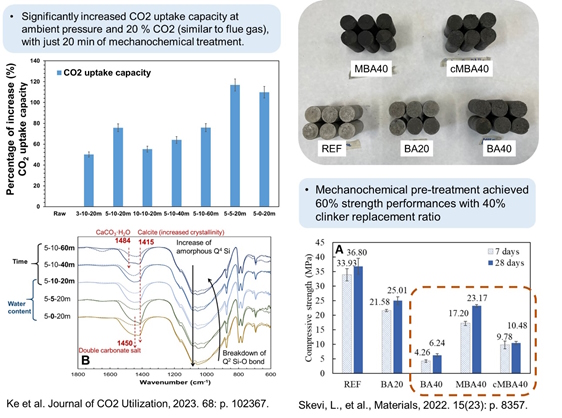Completed: Innovative green process to turn alkali solid wastes into carbon-negative feedstock for the cement industry
In collaboration with the Materials Processing Institute
Over 2 billion tonnes of diverse alkali solid wastes (i.e., biomass ash, cement kiln dust, steel slag) are generated from Foundation Industries worldwide annually and are primarily disposed of through landfills and stockpiling. The volume of these is expected to double in the next few decades, which has brought significant challenges to the cement and metal industries for reaching Net-Zero targets.
This project developed an innovative green chemical process via mechanochemical activation to turn these alkali solid wastes into carbon-negative materials which can be used as an alternative feedstock for producing low-carbon sustainable cement. Mechanochemical activation improve the reactivity of polysilicates (i.e., akermanite), mineral phases commonly present in alkali solid wastes (i.e., biomass ash, steel slag), for direct carbonation under conditions that resemble flue gas conditions. The effectiveness of the mechanochemical treatment was controlled by milling time, ball to sample mass charge ratio, and water content. In particular, the amount of water during the mechanochemical activation had a significant effect on the crystallisation process and crystal structure of the carbonate salts formed during the follow-on direct carbonation processes. Alkali solid wastes treated with mechanochemical activation can be used as alternative supplementary cementitious materials (SCMs) to partially replacing cement clinkers, with up to 40% substitution giving in satisfactory engineering setting times and strength.
The research team is looking into the feasibility of scaling up this novel process from lab-scale. With the fundamental understanding of the mechanochemical treatment processes developed in this study, the technology may be transferred to other foundation industry sectors, such as paper and ceramics.

For recent research updates on related topics, please check Dr Xinyuan Ke’s research group website: https://www.xke-lab.com/
Publications
- Biomass Bottom Ash as Supplementary Cementitious Material: The Effect of Mechanochemical Pre-Treatment and Mineral Carbonation, https://doi.org/10.3390/ma15238357
- Mechanochemical activation for improving the direct mineral carbonation efficiency and capacity of a timber biomass ash, https://doi.org/10.1016/j.jcou.2022.102367
- Comparing the Carbonation Performances of a Low-Clinker Blended Slag Cement with an Alkali-Activated Slag via Thermodynamic Modelling, https://doi.org/10.1007/978-3-031-33187-9_103

Dr Xinyuan Ke
University of Bath xk221@bath.ac.uk
Dr Xinyuan Ke, MIMMM, lecturer in sustainable materials for construction at University of Bath, with eight-years of experience working in the field of cement chemistry and solid waste management. Dr Ke obtained her PhD degree in materials science and engineering at University of Sheffield in 2017 (recipient of departmental Ceramic Prize for best PhD thesis) and been awarded the prestigious Prize Fellowship (2018-2021) by the University of Bath.
She is also an active member of RILEM (International Union of Laboratories and Experts in Construction Materials), leading several technical committee workgroups (TC-281CCC and TC-TES). Dr Ke currently serves on the advisory board of the InnovateUK/ISCF Transforming Foundation Industries Future Leaders Group, representing the cement sector.
Published: February 11th, 2022
Posted in
projects





